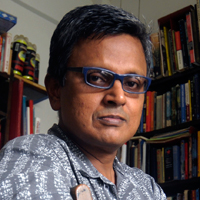“I just want them to be hanged,” the young man said, “because there is no other way to stop it.”

He was referring, of course, to the unspeakable gang-rape in Delhi last December; specifically, to how the men now convicted of the crime should be punished. He was standing outside the court where they were convicted after a months-long trial, and he expressed himself this way to The New York Times. While the actual sentence will be handed down on Friday, September 13, this man was echoing widespread public sentiment about what the sentence must be. From the young woman’s family to citizens like this one, there has been a loud chorus of demands for death.
Let’s have no doubts about what these men did. Driving around in a bus, they picked up a young couple from a Delhi bus stop. They locked the doors. They beat up the man. They dragged the woman to the back of the bus and tore off her clothes. They all raped and sodomized her. They bit her. They shoved a metal rod into her and tore her insides apart. When they had finally had enough, they threw the couple, naked, off the bus into the biting Delhi cold. They even tried to run over them with the bus, before speeding away.
The men were arrested within days and charged with rape, a crime that can attract a maximum punishment of life imprisonment. Two weeks later, the young woman died. The men were charged with murder, under Section 302 of the Indian Penal Code. Now they faced the prospect of being sentenced to death.
A long-established and often-quoted guideline in Indian jurisprudence is that the death penalty should only apply in the “rarest of rare cases.” For example, last year the Supreme Court heard Surendra Koli’s appeal against his death sentence. This was a man who had raped and murdered several young girls, chopped and eaten their body parts. The Court upheld his death sentence last February. His crimes, the judges observed, were certainly fit to be called the “rarest of the rare.”
Can we say the same about what happened in that bus, that Delhi evening?
Let’s have no doubts indeed: what these men did was simply horrible. In my book it certainly qualifies as a “rarest of the rare” kind of crime. Therefore, even an opponent of the death penalty like me can have no argument with a judge whose job is to interpret the laws he works with, who sentences these men to death.
Though there are precedents. In sentencing the BJP politician Maya Kodnani last year for horrific crimes in Gujarat in 2002, Justice Jyotsna Yagnik said she was “opposed to issuing the death penalty … which she felt was against ‘human dignity.’”
Still, the argument that’s necessary here is an older one: with the very idea of the death penalty. But that’s for another day.
Meanwhile, it’s worth asking: if punishment is supposed to be a deterrent, does anyone in India seriously believe that if these men are sentenced to death, we will be miraculously free of rapes? Does any Indian believe that we will, come Friday, see even a drop in the incidence of rape? That Indian women will be suddenly safer?
The only honest answer to those questions is “no.” Because executing four men does not address the endless harassment our women must face daily: from lewd comments to groping, from unwelcome attention to rape. This stuff grows out of peculiar mindsets about women and the crimes against them; indeed, mindsets about what is a crime against women at all.
Here’s an example of what I mean. Faced with mounting criticism over his handling of recent murderous rioting in his state, the chief minister of Uttar Pradesh, Akhilesh Yadav, suggested that it was all a plot by political parties out to get him. In making that point, he said this on September 10: “I have repeatedly said some forces are out to destroy the social fabric of the state. Even trivial issues like Eve-teasing are magnified.”
“Eve-teasing” is a tired and now offensive Indian euphemism for the sexual abuse of women. Not only does it trivialize the harassment nearly every Indian woman faces daily, the very use of the phrase allows this chief minister to call such abuse “trivial” anyway. To understand this, imagine him saying instead, on the very day of a long-awaited verdict in an infamous case of gang-rape, these words: “Even trivial issues like rape are magnified.”
The ugliest reality in all this is that too many of us Indians don’t even recognize the sexual abuse of women, in all its forms, as particularly wrong.
So we might demand death for these men, as the young man outside the court was doing, and I understand those demands, not least when they come from the family. I don’t like them, but I understand them.
But killing the men won’t change the entrenched attitudes toward women that make rapes and other sexual abuse conceivable. Therefore, it won’t make our women safer. Justice, and the memory of a tragically violated Indian woman, demands more from us all.






